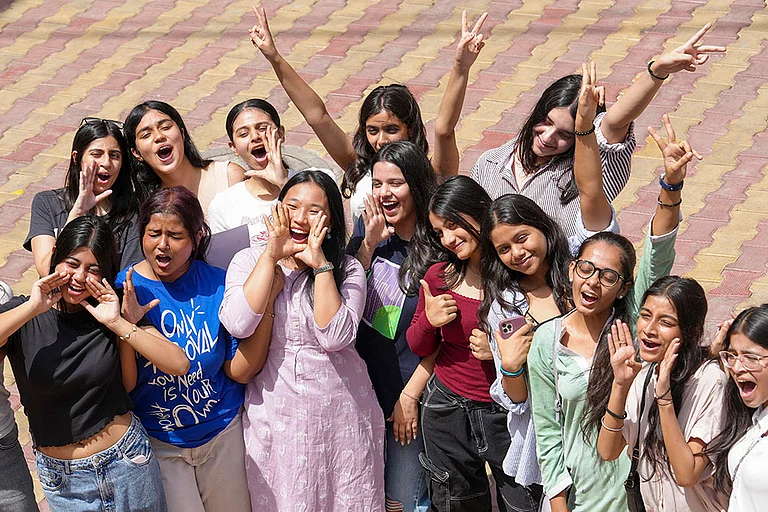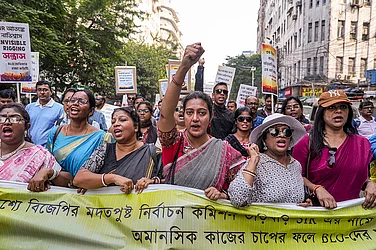Aligarh Muslim University (AMU) has been in the news recently for the wrong reasons. The alleged illegality in the selection of Naima Khatoon Gulrez, who was the principal of AMU’s Women’s College, as its current Vice Chancellor has created a stir the university. Notably, her husband, Professor Mohammad Gulrez who is the officiating Vice Chancellor had ‘selected’ Naima Khatoon through a procedure that many legal experts and AMU court members are terming as illegal.
Those who are opposing the appointment say the Government of India had the power to reject the panel but the President of India did not exercise that power. Those who are against the decision say it was an electoral choice, not a decision made on merit. If there is illegality as alleged, it could be struck down by the High Court or the Supreme Court according to experts.
However, Professor Gulrez and his allies claim no rules and regulations were flouted with regard to this selection. They say that “AMU’s old lobbies with vested interests are resisting a positive change.”
Naima Khatoon is the first woman Vice Chancellor of AMU. The founding chancellor of the university is Begum Sultan Jahan, the Begum of Bhopal. There is a girls’ hostel named after Sultan Jahan at AMU’s Abdullah Girls’ School campus.
Selection Process
The selection process of the VC stipulated that the executive committee(Council or Committee) will select five names. The Executive Council (EC) selects five names. The Vice Chancellor presides over the EC. The VC therefore is the ‘selector’. When the EC chooses the Vice Chancellor it does not elect the VC, it selects. If a family member is a candidate, you cannot be a part of the selection process. The EC rules are very clear on who is a family member. A spouse is a family relation. So, even if a husband and wife are divorced, the ‘likelihood’ of a prejudice can arise, hence, a spouse in that case also cannot be in the selection committee.
When the matter went to the (Allahabad) High Court, Justice J J Meer who was Professor Faizan Mustafa’s contemporary at AMU—one of the nominated candidates for VCship—he recused himself from hearing the matter. An instance of absolute honesty. Justice Meer was a contemporary of Faizan Mustafa at the university long back though Mustafa had not met him since 2004.
Justice Meer by recusing himself showed the highest level of morality. He showed that he would not be taking sides in this matter.
University law does not allow a husband to vote for anyone in the ‘family’ and the law includes the wife in the definition of family. “Even if the husband and wife are divorced the probability of partiality is likely,” says a Supreme Court lawyer and ex-student of AMU.
So, is there any loophole in the law which helped Naima Khatoon’s appointment as VC? “The husband chaired the meeting, he participated in the deliberation, he voted for his wife,” says a legal expert from AMU who does not wish to be named.
How was it Malafide?
It is said that the husband, officiating Vice Chancellor Mohammad Gulrez, changed the composition of the council before the EC meeting. “The EC consists of the senior-most provost. Professor Rafiuddin was the senior-most provost till 2020-21. Three or four days before issuing the agenda and calling the meeting, Professor Gulrez relieved/dismissed the senior-most provost so he could change the order of seniority. So he relieved many provosts and three days later, he re-appointed the same provosts by making a change in their hierarchy. So instead of Rafiuddin, Dr. Sarwar Hussain became the senior-most provost and Sarwar Hussain proposed the name of Gulrez’s wife Naima Khatoon,” he shares. Angry opponents call it a blatant abuse of power. Legal expert says that an officiating VC does not even have the power to appoint a provost. So the EC had authorised him to make a temporary arrangement. What would be that temporary arrangement? That if the provost is dead, then the senior most-warden is invited to officiate. As the officiating VC, he didn’t have the power to make appointments because he didn’t have the power to act on behalf of the EC. It being alleged that the appointment is malafide because he changed the seniority order and brought his close confidantes into the EC and as court members for selecting his wife as the new VC.
More Conflicts as per the Law
In the case of making reappointments, a reappointment is considered a fresh appointment, which is also the law. So, provosts being reappointed became juniors in the new hierarchy. But there were chairmen who were appointed without being subjected to this rule. And they were retained as members of the court. Twenty chairmen became members of the university court, out of those, it is being said that three or four of them were not qualified to be there as members.
Adjudication by Overruling the Objections
Gulrez later said that he was not in the adjudicatory position and so his right to vote was similar to that of other members. Some members raised objections to his participation and chairing it. These facts are documented in the minutes of the meeting. He adjudicated by overruling the objections. He was in an administrative position and in an adjudicatory position—a conflict of interest.
According to the lawyer, in the AMU court, about 80 vacancies were not filled and it was deliberate because most of the external appointees would not be under the VC’s control. “If he had filled those positions, his wife’s name would not have been cleared,” he adds.
Mathematics of the Votes
Allegedly, for the first time in the history of AMU, not only the recounting of votes but also re-voting took place before the third round after which Khatoon’s candidature along with that of two others—Professor M U Rabbani, a well-known cardiologist at JN Medical College and founder member of the medical college in AMU, and Professor Faizan Mustafa, a lawyer and VC of Chanakya Law University, Patna—grew stronger, in that order.
However, an associate of Gulrez’s revealed that re-voting was done because of the tie that happened and it was allowed/instructed by the Election Officer.
Coming to the Mathematics of the votes that the candidates received–there were five candidates–namely, M U Rabbani, Furqaan Qamar, Faizan Mustafa, Mujahid Beg and Naima Khatoon. Qamar and Beg got subtracted and Naima, Faizan and Rabbani got voted. Naima received 8 votes, Faizan got 9 votes, Rabbani got 8 votes, and other people got seven votes.
“If on the basis of illegality, the votes of Sarvar Hussain and Professor Gulrez are removed, Naima’s vote count remains 6, in that case she could be excluded from the EC itself” says an EC member seeking anonymity. So, either Rabbani or Mustafa would have been the VC.
More Appeals
VC candidate Professor Mujahid Beg has filed a case against the selection but he has been avoiding the media “for misquoting” him. Professor Beg spoke to this correspondent over the telephone about whether he has appealed in the court against the present selection of the VC. “Yes, I have,” he said. “The whole process was illegal…However, I had my struggles appealing against it and am now waiting for the result. I have challenged the whole procedure in the court. When the whole process is illegal, how can the product be legal? I am sure the truth will prevail whenever it does. And I have full faith in our justice system and Allah.”
Another candidate whose name was subtracted is Furqaan Qamar, Professor of Management Studies at Jamia Millia Islamia, Delhi. Candidate Faizan Mustafa, who stood second in terms of votes after Professor M U Rabbani, who got the highest votes “but in the second round of voting”, has challenged the move on legal grounds. When Mustafa was contacted, he said he was “asked to file an affidavit and he has already filed it”.
What Does the Other Side Say?
Professor Gulrez told this correspondent, “I am in a lot of pain over this issue. I don’t want to explain my position. I earned more enemies than friends in the university over the last one year. I would only say that I have not flouted any university/UGC rules in the selection. Everything has been done in accordance with the written law of the university. He added, “Naima Khatoon is an independent woman with grit who is free to exercise her own choice even against my wishes, do everything possible to be on an honourable seat and make history. This is what the conservative lobby has issues with, too.”
A close associate of Professor Gulrez’s, seeking anonymity, says that Naima Khatoon and Professor Gulrez do not belong to any lobby at AMU. While the former is from Uttarakhand, Khatoon is from a humble background and hails from Odisha. And both these states have no lobbies at AMU while lobbies from Bihar, Azamgarh, Aligarh, Murshidabad, Najibabaad and other small cities of UP are established and active, not giving space to non-lobbyists or “externals” as they term it. He also adds that Professor Gulrez is hailed as a great teacher and a good human being. He was chosen on merit by the outgoing VC, Tariq Mansoor. And Khatoon fulfils all qualifications to be a VC–the primary requirement for which a professorship of 10 years, which she has. And she is considered a wonderful administrator too.
Some voices were raised in the university in favour of Khatoon since she was facing massive opposition as a prospective first-time female VC of AMU.
“Her being appointed as the VC is most welcome but it should have been legal, as per the law of the land”, say the other contestants and some court members. This is not all. According to the UGC rules, which the university mandates, a post of principal is meant to be for five years. But Khatoon held that post for ten years. “So her continuing as a principal is illegal,” says a senior court member who does not wish to be named. He also cites the example of the Principal of the Engineering College, Professor Sufiyan Baig, who was removed after five years as he had completed his term.
An source at the VC office requesting anonymity told this correspondent, “A search committee was demanded to be set up for looking into the matter of the current appointment. This was delayed till Naima Khatoon completed her 10 years as the principal of Women’s College— the number of years necessary to be nominated for the post of VC.”
Odisha Lobby at Work?
The Education Minister, Dharmendra Pradhan, is from Odisha and so is CAG Director Girish Prasad Murmu. Naima Khatoon too is from Odisha. Many allege that the “Odisha Lobby” has played a significant role in this selection. However, a senior court member dismisses this by saying that “doesn’t matter much once you have ‘qualified’ to be a VC, unless it was illegal.
Naima Khatoon has allegedly not resigned from the post of principalship and has asked a male professor to “perform duty” during her absence. Experts say this is not illegal. If the court removes her from the post, she can go back to her previous post. However, for the first time in the history of AMU College, a male has been performing the duties of a principal instead of a female.
Gulrez says, “The President and the PM have cleared her name. Are you actually questioning their wisdom? Now it is up to the court to decide and we have faith in Allah. We are just fortunate to clear it through legal means. I have reports that some two to three thousand letters from different quarters have gone to the PM and the President against me. I have made more foes than friends during my tenure as a Vice-Chancellor even when I flouted no rules.”
A Dangerous Move for AMU?
Well-wishers of the university smell a rat in the new appointment. They foresee it as “disastrous for Muslims and SC/STs in the long run, as Muslims would lose a lot if the new appointment will hold” post June 4. Seeking anonymity, a senior diplomat and former Vice Chancellor of AMU reveals, “This is an engineered trap for the university by its former VC Tariq Mansoor who before leaving had planted his puppets inside the university. He has made sure that his ‘yes men’ have been favoured with privileges, that includes the current officiating Vice Chancellor Mr Gulrez and his wife Ms Naima, who will not go against his wishes and plans about the university.”
What plans? “It could be anything that demoralises the Muslim community.” The plans, he also reveals, would be disastrous for AMU as an institution that prioritises Muslims and paves the way for their progress in life. It will also have an adverse effect on SC/ST students/quotas.
Minority Character in Danger?
The source says that the new regime at AMU will make sure that AMU will be stripped off its minority character if Naima Khatoon remains the VC and Gulrez the Pro-VC. However, Hamid Ansari, former Vice President of India and former VC of AMU has a different take on the university’s minority character. “If 100 per cent budget comes from the government, then it means the university in under the government’s control. What is the meaning of its minority character? The minority character is an emotional attachment of those who have affinity/contact with the university. The same government control is there in all other universities, be it Jamia Millia Islamia, Allahabad, Delhi or Lucknow universities. So a minority character has no such significance as such.”
The meaning of minority character is that a percentage of admissions in certain areas would be reserved for Aligarh students. That’s not needed in theology or arts faculties but competitive faculties such as medicine or engineering because the competition is very high there, So, a certain percentage is reserved for admission for some, and it reaps huge benefits. Otherwise there is no meaning of minority character as such says Ansari.
A member of AMU’s non-teaching staff says, “Jamia Millia Islamia (a part of AMU, which in 1925, attained a separate independent status of a deemed university) is a minority institution. It has reserved quota for women and Muslim women. AMU doesn’t have any such quota. It has 50 per cent internal reservation for students who studied in AMU schools. Otherwise, all other students come by competition on merit. They could be from any religion, state, or UT. So, at AMU, minority character is just a matter of sentiments.”
However, Professor Gulrez says, “I have myself fought for the minority status of the university in 2017. I was regularly in Delhi and spent a lot of money to retain the minority character. I have lived in the hostel for eight years and I know how it is important for AMU to retain its minority character. We are still serving first generation Muslims who come from very poor financial backgrounds and who need hostels and studies here on meagre fees or no fee.”
The Past and the Present
The roots of the present controversy date back to the appointment of its last Vice Chancellor Professor Tariq Mansoor. Soon after his tenure at AMU had concluded, Mansoor got an extension of two years against the staff and the students’ wishes. He served as the Vice Chancellor of AMU from May 17, 2017 to April 2, 2023. In his extension period, he appointed Professor Gulrez allegedly against the rules of the university. Mansoor, after completion of his extended tenure at AMU till April 2, 2023, became the nominated member of Uttar Pradesh Legislative Council by the BJP. He was also nominated by the PM as a Member of Padma Awards Committee, Govt. of India for 2023-24 and was also a Member of the Medical Council of India.
Hamid Ansari puts the current controversy in perspective. He says, “AMU is not facing anything that other universities have not faced. Barring just a few, in all the central and some state universities in India, the problem is the same. What is the main function of a university? It is proper functioning and academic excellence, if that is not happening, then problems are bound to happen. The same situation is there with Allahabad and Lucknow universities. Whether there is any politics involved in it or not, the problems remain the same.”
On the controversial appointment, Ansari comments, “Dekhiye ye sarkaar ka faisla hai. There is a process of selection of the Vice Chancellor. The process is that the University selects five names. These names are sent for verification to the court. The court can take away two names, and seal three. And it sends those three names to the President. This is a governmental process. Whether the procession has been legally followed or not is subject to verification. If the process is not legal, then one should go to the court, that’s the only way to protest against a selection.”












.png?auto=format%2Ccompress&fit=max&format=webp&w=768&dpr=1.0)











